TODAY’S OLD TESTAMENT READING- JOSHUA 7:16- 9:2
The Lord was responsible for the victory at Jericho (Joshua 6:1-27). He made Himself known as Israel’s commander in chief (Joshua 5:13). However, He was not consulted in the plan to take Ai (Joshua 7:2-5), so He can not be held responsible for Israel’s defeat.
Achan’s sin was at this time unknown to Joshua or the general public. He coveted the fancy garment from Babylon and the silver and gold, took it and buried it in secret. But his secret was known to God and stirred His wrath towards the people of Israel (Joshua 7:1).
36 Israelites were killed as the Israelites suffered a humiliating defeat at Ai even though they had an army of 3000 that far outnumbered the enemy.
Joshua tears his clothes, puts ashes on his head and falls prostrate before the Lord to make his complaint. He reasons that the Lord’s reputation was being tarnished by allowing this defeat. The Lord will have nothing of it and interrupts Joshua’s prayer, telling him to get up and command the people to consecrate themselves because He is coming to sort them out! Early the next day, the Lord adopts a method of progressive detection and Achan’s sin is found out. He makes his confession after his tribe appears before the Lord. Somehow it is made known that the culprit was a member of the tribe of Judah, of the clan of Zerah, of the family of Zabdi and is Achan, the son of Carmi.
Achan confesses, “I have sinned.” He even says, “I have sinned against the Lord God of Israel’. But confession of sin itself does not guarantee a person’s salvation from the wrath of God. Confession did not save Achan (Joshua 7:20), Pharaoh (Exodus 9:27), Balaam (Numbers 22:34) or Judas (Matthew 27:4). They all confessed their sin. But the other side of repentance is a turning from sin to Christ. There must be a transfer of trust to God’s merciful promise of a Savior. There must be a turning to the Lord.
King David received assuring words when he made his confession:
2 Samuel 12:13 13 Then David said to Nathan, “I have sinned against the LORD.” And Nathan said to David, “The LORD also has taken away your sin; you shall not die.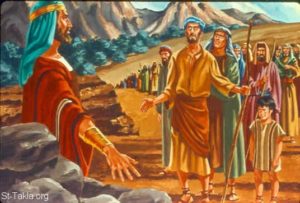
Sin has consequences, even when confessed and forgiven. David realized this when he numbered the people of Israel, sinning against the Lord and causing a plague to come against his people as divine retribution (2 Sam 24:17). Achan’s sin put the entire community in danger and caused them to suffer loss.
Strict discipline is given to Achan and his family for disobeying God’s explicit orders to keep themselves from things devoted to destruction (Joshua 6:17-19). Achan admits his sin of covetousness and the stolen plunder is dug up in his tent. He and his family are stoned to death and their belongings are destroyed.
Achan’s sin had a profound effect upon the whole community. The Lord saw Israel as one body. Our sin effects the whole body also.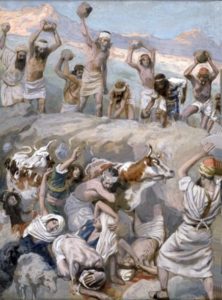
This is the first recorded act of disobedience after Israel crossed the Jordan, and Achan’s death was the first commanded punishment in the new land. The Lord is making the point that His Word is not to be regarded as a suggestion, but a command. (The first recorded sin after Pentecost is Ananias and Sapphira lying to the Holy Spirit and the Jerusalem congregation about their gift giving and they are disciplined with an early death as a result of it. (Acts 5:1-11)
Achan is stoned to death in a valley that is given the name “Achor” meaning ‘trouble’, or ‘affliction’. Remember, Joshua said, “Why have you troubled us? The LORD will trouble you this day.” (Joshua 7:25).
Later in the history of Israel, as we shall see, the Valley of Achor, the scene of Israel’s trouble, will become “a door of hope” to restored Israel (Hosea 2:15).
Hosea 2:15 15 “Then I will give her her vineyards from there, And the valley of Achor as a door of hope. And she will sing there as in the days of her youth, as in the day when she came up from the land of Egypt.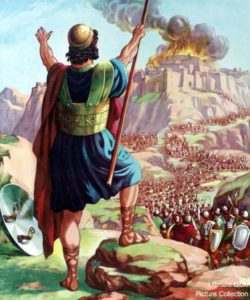
God is a god of a second chance, and He grants them a do over, so they can defeat and capture the city of Ai. This time the battle plan will not be according to their calculations but the Lord’s instructions. The children of Israel heed the Lord’s directions given to Joshua and successfully ambush the city.
There is an interesting record of Joshua raising the javelin in his hand, until he had devoted all the inhabitants of the military fortress of Ai to destruction. It reminds us of Moses raising his hands on the mountaintop while Joshua and the Israelites waged war against the Amalekites in the valley. (Exodus 17:8-13).
Joshua builds an altar in thanksgiving for the victory that the Lord gave. He sacrifices burnt offerings and fellowship offerings, makes a copy of the Law of Moses on stone and reads it before the people as they renew their covenant relationship with God.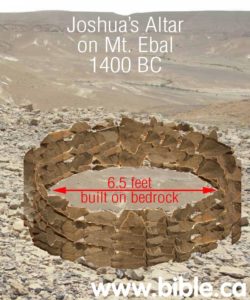
He builds the altar according to God’s instructions (Exodus 20:24-26) with no cut stones, emphasizing that their victories were the result of God’s grace and not wrought by human hands.
On April 6, 1980, Adam Zertal, Ph.D., Prof. Of Archeology, Univ. of Haifa was doing a formal archaeological survey of the traditional lands of Manasseh and discovered a Hebrew Altar that dated to 1250 BC. Using pottery to date the site Zertal. The rectangular altar we see today was built about 1250 BC. The 6.5-foot circular stone structure with burnt kosher bones inside was is located directly beneath the rectangular altar and was built about 1405 BC by Joshua.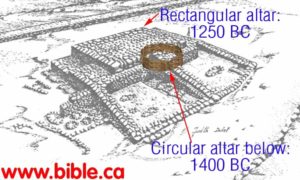
Adam Zertal said that the discovery of this altar made a Bible believer of him. He has undergone a transformation of faith that is truly remarkable. Like most of his fellow Israeli archeologists, he did not believe the Bible stories of the exodus to be true. But that all changed in 1983, three years after Zertal first stumbled on the site while doing a formal archeological survey of the area. After studying the structure for three years with no idea what is was used for, he suddenly realized that it was the site of Joshua’s Altar. Now he believes the Bible. 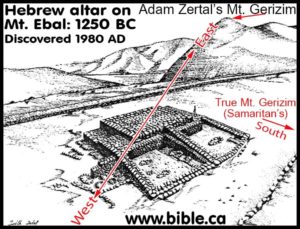
Adam Zertal: “We discovered this place, all covered with stones, in April 1980. At that time I never dreamt that we were dealing with the altar, because I was taught in Tel Aviv University – the center of anti-Biblical tendencies, where I learned that Biblical theories are untrue, and that Biblical accounts were written later, and the like. I didn’t even know of the story of Joshua’s altar. But we surveyed every meter of the site, and in the course of nine years of excavation, we discovered a very old structure with no parallels to anything we had seen before. It was 9 by 7 meters, and 4 meters high, with two stone ramps, and a kind of veranda, known as the sovev, around.”
NEW TESTAMENT READING: LUKE 16:1-18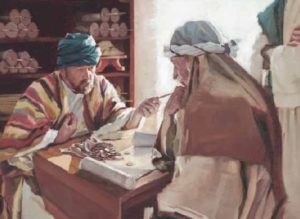
Jesus tells the story of a rich man and his unrighteous steward. The rich man’s employee is found out for being wasteful and crooked. When he learns that he is about to be fired, he makes appointments to meet with all his master’s clients who have not yet paid for their services and he deceitfully adjusts their bills, offering great discounts on the amount of money originally owed to his master. He knew that they would be indebted to him for this great favor and thereby feel obliged to offer him a place to stay when he was put out of his job. The surprise is that when his manager discovers this dishonest deed for which he was the victim, he commends him for his shrewdness. Why? Because his dishonest employee is exhibiting values esteemed in his own corrupt business world. He was using his master’s money to buy friends for his future living situation. Jesus often refers to the normalcy of corrupt practices of the natural man’s deceitful heart (Jer 17:9). (Examples ‘If you then, being evil, know how to give good gifts to your children.’- Luke 11:13; ‘Hear what the unrighteous judge said’ Luke 18:6).
Jesus does not commend the man’s dishonesty. He tells the story to illustrate that the most wicked of this world are shrewd enough to provide for themselves in light of the coming evil. Yet his hearers should be more shrewd, not in dishonest practices, but thinking wisely about their eternal dwelling place, heaven or hell.
Luke 16:9 9 “And I say to you, make friends for yourselves by means of the wealth of unrighteousness, so that when it fails, they will receive you into the eternal dwellings.
Jesus turns this story to address his disciples (sons of light-believers) admonishing them to use what material wealth we have now towards the eternal purpose of seeing people come into the kingdom of God through faith in the gospel, knowing that our material wealth will ultimately fail us in the future.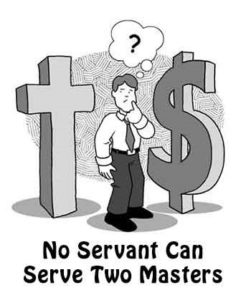
Jesus follows this story with another truth: No servant can serve God and money.
Like the Pharisees we can easily justify our selfish pursuits, our accumulating wealth, and our disregard for the eternal concerns of the Kingdom of God. “But God knows your hearts”, Jesus says, ‘What is highly valued among men is detestable in God’s sight” – We have just read of such examples: the practice of both the rich man and the unrighteous servant were detestably dishonest, as is the servant who claims to love God, yet serves, and lives for money and material wealth.
Jesus then tackles another subject in which men justify their disregard for the values of the kingdom of God: Easy divorce. Jesus knew that many people. Even in his day, divorced in order to move on to a new partner, legitimatize their adultery or the adultery in their hearts. (Luke 16:18)
READING FROM THE BOOK OF PSALMS
PSALM 82: 1-8
In this Psalm, the Psalmist addresses the unjust judges of this world as ‘gods’, those who were originally appointed as God’s representatives, ‘sons of the most High’, to execute righteous judgment on the earth. Yet they walked in darkness without spiritual, moral or intellectual understanding.
God warns the wicked judges that they will perish. The Psalmist cries out for righteous judgement:
PSALM 82: 8 8 Arise, O God, judge the earth! For it is You who possesses all the nations.
TODAY’S PROVERB
Proverbs 13:2–3 2 2 From the fruit of a man’s mouth he enjoys good, But the desire of the treacherous is violence. 3 The one who guards his mouth preserves his life; The one who opens wide his lips comes to ruin.
PRAYER: Lord, teach us to wait upon You and not act presumptuously. We don’t honor You as Lord in name only. You are worthy of our obedience. Help us to follow Your lead, In Jesus’ Name. Amen.
